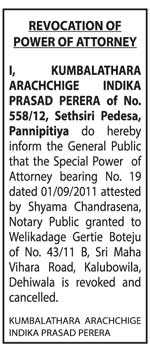Sunday Feb 22, 2026
Sunday Feb 22, 2026
Monday, 17 December 2018 01:02 - - {{hitsCtrl.values.hits}}
The UK’s The Guardian newspaper yesterday quoted Hasnain Malik, the head of equity research at Exotix Capital, as saying markets would welcome the end of the standoff. 
“But it also means a return to the political paralysis which has held back growth over the last three years,” Malik was quoted as saying.
“It seems that only an early election which results in a clear parliamentary majority for either Wickremesinghe or, more likely, Rajapaksa would resolve that.”
Since the 26 October political crisis, foreigners have been net sellers to the tune of Rs. 10.6 billion from the Colombo Bourse though on Friday they were net buyers for the first time in 14 sessions. Year to date the CSE has seen a net outflow of Rs. 20 billion.
The bond market saw outflows of about Rs. 56 billion between 25 October and 14 December, Central Bank data showed and Rs. 148.2 billion year to date.
The rupee has weakened about 3.8% since the political crisis began and 17% year to date.
The Guardian report also quoted N. Sathiya Moorthy, a director of the Delhi-based Observer Researcher Foundation, as saying: “Not much will get transacted in terms of government business and policies.”
He said Wickremesinghe’s new ruling coalition was dependent on Tamil legislators and would be under pressure to accede to their demands.
That, in turn, could be exploited by Rajapaksa, whose Buddhist nationalist party traditionally takes a hard line on Tamil demands for greater autonomy and accountability for crimes committed during the country’s three-decade-long civil war.
“Rajapaksa has already sounded the battle bugle on the Tamil issue,” Moorthy said.